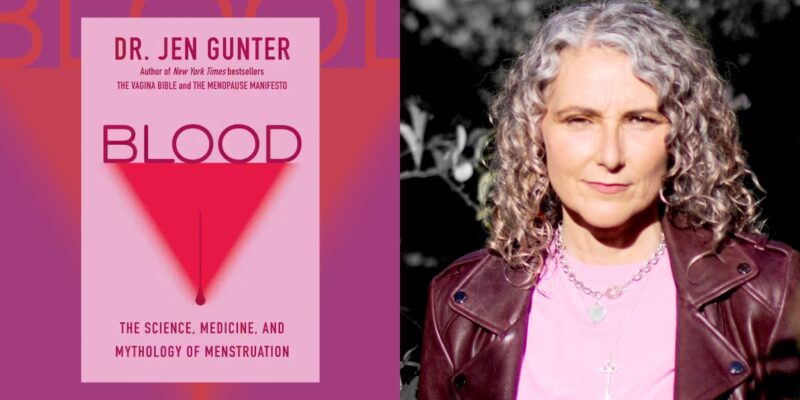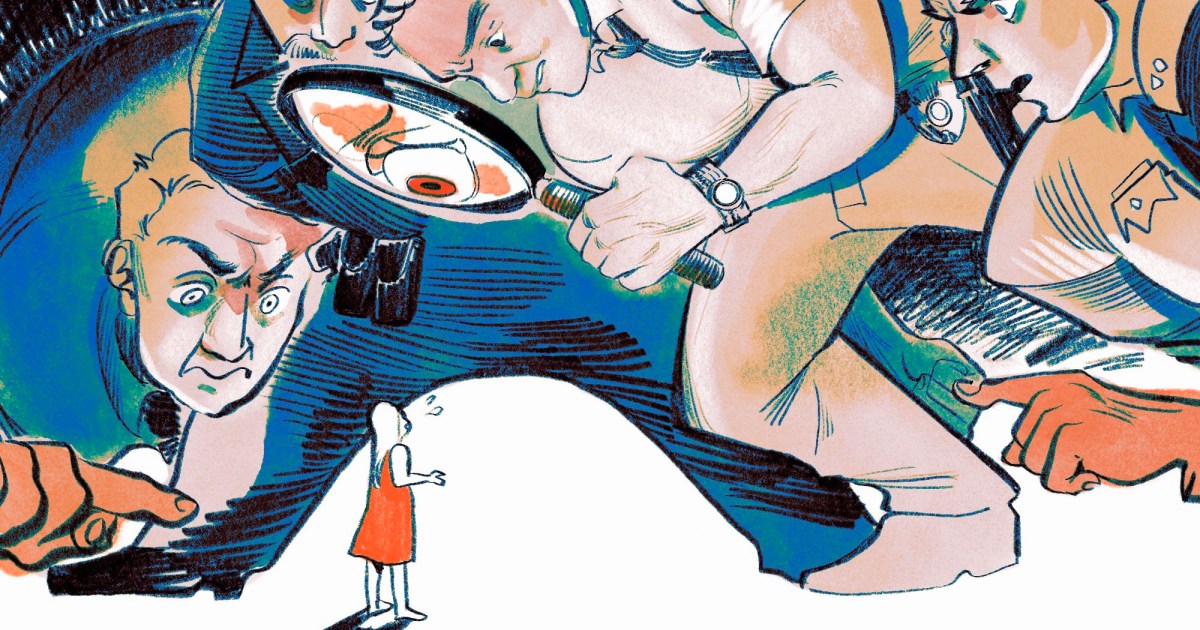
Periods are an undeniable part of most women’s lives, but for the bulk of history, science has only really cared about women’s reproductive tracts for one reason: “improving pregnancy outcomes,” writes Jen Gunter in her new book, Blood, “rather than improving the lives of those who lived with those reproductive tracts.” Cultures the world over have long considered menstrual blood dirty, toxic, and shameful. The US government didn’t even require women to be factored into the medical studies it funded until 1993. As a result, “we clearly have this big information gap,” Gunter told me when we caught up via Zoom in February. “I hear stories every day about people being dismissed because of heavy periods, or because of pain, or they don’t even understand the medical condition they have.”
Gunter has made that information gap her calling card. She juggles her job as a gynecologist and pain physician in the Bay Area with a career as a bestselling author, podcast host, and social media misinformation debunker/nemesis of Gwyneth Paltrow’s wellness empire, Goop. In all her work, she’s a fierce advocate for using facts to empower people to understand their health, their bodies, and the power structures that have kept them in the dark.
Blood: The Science, Medicine, and Mythology of Menstruation combines thorough-yet-accessible science made clear with analogies (like soufflé baking), cultural analysis, and historical research to tackle the ins and outs of periods, hormones, menopause, disorders like endometriosis, the evolution of menstrual products, and abortion. It dispels many period myths, including the idea that menstruation is controlled by the moon. While it’s a dense read, this is no textbook; as in her previous books, Gunter calls out the patriarchy and the government for not funding research into women’s bodies. She scolds the fertility apps that offer free menstrual tracking only to sell that biodata to the highest bidder. She has no patience for “forced-birth” lawmakers, including those who seek to define embryos as people in order to ban not just abortion but also in vitro fertilization. “I suspect the hardliners thought it through and are happy to take IVF off the table, and the others are dumbfounded that it happened,” she tells me.
And she’s exasperated by those who deploy pseudoscience to mythologize periods and capitalize on the hype. She casts a critical eye on what she calls the wellness industrial complex, and more specifically, Big Natural Menstruation, “sites that are often inhabited by naturopaths, period coaches, and others who sell unregulated supplements to fix ‘broken’ periods.” Gunter not only seeks to inform—she wants to hold people who misinform accountable.
We caught up bright and early at 7am on a Monday in mid-February, right after her return from her Canadian book tour.
This conversation was condensed and lightly edited for clarity.
You already wrote The Vagina Bible. How did you know there was a need for another book focused specifically on menstruation?
It became very clear during Covid and the start of the vaccines that people really didn’t have an understanding of some of the basics of how the menstrual cycle worked. People worried that you could shed a spike protein that could affect somebody else’s cycle. There were lots of questions about the vaccine. It sort of coincided with the time when there was an increase in disinformation on Tiktok and Instagram about the menstrual cycle—all kinds of people saying that you could, oh, ‘Eat this diet and you can fix your cycle. Take this supplement.’ Every day I would get direct messages from people saying, ‘Is this true?’
I realized that one of the common denominators is, despite some people menstruating 300-400 times in their lifetimes, they have very little understanding about the cycle. We clearly have this big information gap. And there’s many, many reasons for it, but I’m trying to bridge that gap for people.
That’s interesting that Covid kind of sparked this. Was it mainly questions people had about how the vaccine might influence their periods?
Some of it was concerns about the vaccine causing infertility, which would be biologically impossible if you understood the menstrual cycle. That tells me that we’ve been surviving on menstrual lore for most of our lives as opposed to menstrual fact. I mean, hormones weren’t even identified until the 1900s. There’s so much myth and mythology, and the menstrual cycle has been co-opted in so many different ways—by religions, the patriarchy—that it just seemed that this is something that it was easier for people to fall victim to.
You trace a lot of mythology and history around cultural attitudes about menstruation in the book. What are some of the lowlights that stuck with you?
There’s this cross-cultural idea that women are dirty, or that menstruation is gross—grosser than a nosebleed, grosser than a skinned knee, grosser on a different level. You hear it in euphemisms, like ‘feminine hygiene products,’ and jokes: ‘you must be on the rag.’ Many religions and cultures still exclude women from services, exclude women from preparing food when they’re on their menstrual cycle. The idea that somehow you’re unclean and can’t be in your own kitchen is, you know, pretty damaging.
You pause in the book on the term “feminine hygiene product,” which I had never thought very closely about. How does it help perpetuate stigma?
Most people associate feminine with a very specific phenotype, if you will, but there are all different kinds of phenotypes. Not everybody thinks of themselves as feminine. Certainly, when I was 14 and menstruating, I didn’t think of myself as feminine. I liked dinosaurs. Do we want to think of a 10-year-old as feminine? Because there are nine and ten-year-olds menstruating. There are trans men who menstruate and non-binary people. This idea that we should tie it to feminine imagery is problematic. It’s not what makes you a woman.
And to me, the word hygiene really implies like bandages and germs. It does imply that there’s something that’s unclean, right? We don’t use menstrual products because we’re worried about contaminating the world—it’s not like having the cold virus on your hands and you’re giving it to somebody else. You want to have menstrual products because you want to catch the blood and not get it on your clothes.
You also write about how the first disposable pads introduced in the United States were tied to the concept of cleanliness, because they were named Listers’s pads, after Dr. Joseph Lister, who came up with the idea of sterilizing surgical equipment.
Yeah, so the legacy of menstrual pads is really related to ideas about being dirty and unhygienic. Yet we don’t have to call toilet paper ‘anal hygiene products.’ That’s wiping away feces. You have a product designed to deal with feces, and we can call it ‘paper.’ Just saying.
If women’s reproduction and therefore menstruation serves society to perpetuate human existence, why do you think it would benefit society to have so much shame around menstruation?
If you want to oppress half the population, finding a visible way that half the population is different is a pretty good way to do it. ‘Oh, you bleed? That’s a sign of your physical inferiority.’ If we lived in a truly just society, menstrual products would be free, ultrasounds for issues related to the menstrual cycle would all be free, we would have universal childcare, we would have adequate maternity leave, we’d have all these things because these things benefit society. This idea that you’re oppressing, or blaming, half the population doesn’t make any sense. But people or systems don’t stay in power because they make sense.
I think it’s super cool that the very inner muscle layer of the myometrium of the uterus can change directions. It can move in one direction to help get menstrual blood out, but then it can also move in the other direction to bring sperm up. How the hell does evolution come up with that? How much trial and error? It makes me always think about those time travel movies where people have to live like the same loop over and over and over again, until they get it right.
And also the idea that spontaneous decidualization [when progesterone triggers the cells of the uterine lining to irreversibly transform in preparation for the possibility of implantation] was so important for humans that it had to happen. We wouldn’t be these people with these big brains without it.
I don’t feel like the question of “Why do we menstruate?” is something anyone ever talks about.
When you look so called women’s magazines, they really don’t talk about the biology of menstruation very much at all. I don’t think I’ve ever seen it. I mean, they might talk a bit about cramps. They’re so obsessed with the vagina and pubic hair.
But I just find it fascinating that [menstruation] is such a taboo. I mean, you’re the first American journalist that has interviewed me about the book.
Really?
Yeah. Both the New York Times and another major newspaper turned down op-eds. I’ve just done this big Canadian tour, and I was just on morning shows there. There were male interviewers asking me about menstruation. It’s just such a difference. I don’t know if it’s because it’s more puritanical down here.















